Seasonal Guide to Eating in Italy
Eating in Italy is one of the great experiences of visiting this country. As one of the world’s most beloved cuisines, the secret of Italian food lies in its seasonal ingredients. Life in Italy certainly revolves around incredibly delicious food. Eating seasonally in Italy means you’re eating fresh ingredients at the height of their flavor and… at exactly the correct time.
This post contains affiliate links that help keep this website running. By purchasing through our links, we make a small commission at no extra charge to you. Thank you for your support!
For Italians, eating seasonally is a way of life. Period. If you want to sample the heart and soul of what makes Italian food so divine… you have to eat what’s in season. Eating seasonal is always a good idea, for many, many reasons… from better taste to better health, seasonal fruit and vegetables should be a must in every kitchen.
When you choose in-season produce, you choose health. Fresh fruit and vegetables are full of vitamins and minerals which, though, start to disappear as soon as they’re picked. So let’s take a look at each season and what you will find available in the shops and markets in Italy.
Winter:
Winter eating in Italy leans into comfort food—warming, earthy, and a little rustic. It’s really just the last chapter of the autumn harvest, but with a few stars that only show up once the temperatures drop.
What will you find in season? One of the first winter arrivals is radicchio, which pops up in December with that gorgeous purple color. It brings a bold, bitter note to salads and is just as good grilled with a squeeze of lemon and a shower of parmesan. You’ll also see its cousins—treviso and tardivo—in markets. They’re even more dramatic-looking, and locals treat them like seasonal treasures.
Citrus season kicks in not long after. By February, oranges take over every market stall, especially the famous Sicilian blood oranges. That deep red color comes from the unique microclimate around the Conca d’Oro. These oranges are sweet, tart, and honestly perfect for everything—juices, cakes, salads, or just eating over the sink like a kid.
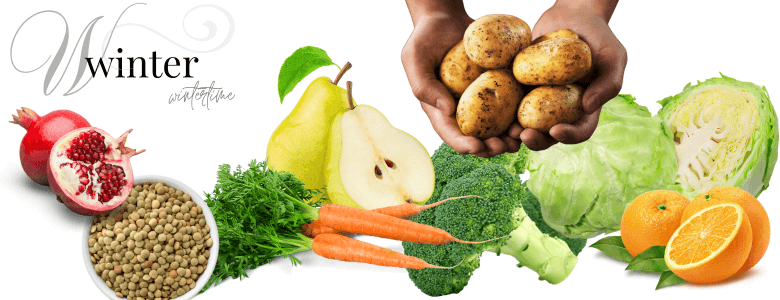
Winter is also prime time for hearty greens and root vegetables. Think cabbage, fennel, leeks, and those knobbly potatoes that somehow taste better here. Lentils and beans show up on repeat, especially around New Year’s, when lentils are eaten for good luck. You won’t see fresh berries or summer produce right now—Italy stays pretty true to the seasons. Strawberries in December? No, thanks.
beans (fagioli)
broccoli (broccoli)
cabbage (cavolo)
carrots (carote)
cauliflower (cavolfiore)
clementines (clementine)
kale (cavolo riccio)
lentils (lenticchie)
oranges (arancie)
pears (pere)
persimmons (cachi)
pomegranates (melagrane)
potatoes (patate)
spinach (spinaci)
Some of our Favorite Winter Dishes:
- Gnocchi or ravioli di zucca: pastas made with creamy pumpkin sauce
- Tagliolini al tartufo nero: pasta with black truffle shavings
- Ribollita: Tuscan bread soup made with bread and vegetables, often from leftovers. There are many variations, but the usual ingredients include leftover bread, cannellini beans, lacinato kale, cabbage and inexpensive vegetables such as carrot, beans, chard, celery, potatoes and onion.
Spring:
Spring marks the end of the root vegetables and March becomes a transitional month when spring and summer produce begins to get planted. March’s star is the leek and will be found in soups and so much more.

April is all about artichokes – a beloved Italian vegetable that will be found in every market and restaurant. Unfortunately, its season is very short so enjoy them when you see them! My personal favorite is the Roman artichokes which are smaller and more tender. Artichokes have an extremely short growing season, peaking in spring.
May’s highlight is the asparagus. This is when you will find the green and white varieties on menus throughout Italy.
artichokes (carciofi)
asparagus (asparagi)
beets (barbabietole)
cherries (ciliegie)
fava beans (fave)
kiwi (kiwi)
lemons (limoni)
strawberries (fragole)
zucchini flowers (fiori di zucca)
Some of our Favorite Spring Dishes:
- Caprese Insalata: mozzarella and tomato salad with a drizzle of fresh olive oil
- Carciofi alla Giudia: deep-fried artichokes, a specialty of Rome. For that matter, any carciofi will do for me
- Arugula: A strong, peppery flavored spiky leaves lettuce, with a slight ‘bite’ to them. Whether it’s a salad or piled over a pizza with proscuitto. Also known in Italy as rocket or rucola.

Summer:
Summer is the best time for most, but not all, fruits. Melons are the big draw this time of year. Also, you will find lemons in Sorrento, the Amalfi coast, and of course, Sicily.
Hands down, June’s favorite fruit would be strawberries. They begin producing in May and well into June. A very close second would be figs found toward the end of June. The large purple variety is amazing.

July has so many varieties of vegetables available but it’s the abundance of blueberries you might notice first. Don’t forget to check the menus for fresh cantaloupe and prosciutto. A pairing like no other… the sweetness of the cantaloupe along with the saltiness of the prosciutto – a match made in heaven. Eating in Italy – eating this particular pairing is one of my favorites.
In August, tomatoes and eggplants are the star of the show.
basil (basilico)
berries (frutta di bosco)
cantaloupe (melone)
cucumbers (cetrioli)
eggplant (melanzane)
figs (fichi)
peaches (pesche)
peas (piselli)
peppers (peperoni)
plums (susini)
tomatoes (pomodori)
watermelon (cocomero)
zucchini (zucchine)
Some of our Favorite Summer Dishes:
- Fichi: Perfect time to enjoy figs on your charcuterie board
- Prosciutto e melone: prosciutto with melon, sometimes as an appetizer or light lunch/dinner
- Fiori di zucca: zucchini flowers are filled with cheese and fried. Did you know that fizzante (fizzy water) is used to make the batter light?
Autumn:
The fall harvest in Italy is very similar to that in the States. Think grapes, apples, squash, mushrooms – but eating in Italy… you also get exquisite truffles!
September is another one of those transition months. Summer is winding down into fall and the markets often offer the best of both worlds. Hands down the highlight of September is the porcini mushroom.
Don’t be put off by the green variety of figs found in September. At first, I thought they weren’t ripe – but they are… and full of flavor.

Pumpkins are at their height in October, as well as chestnuts. You will find carts selling them in almost every town and city in Italy – their roasting fragrance filling the air.
November is a very special time of year in northern Italy with one of the rarest and most expensive foods in the world… truffles. The white truffles of Alba are extraordinary and more expensive than the more common black ones.
apples (mele)
chestnuts (castagne)
fennel (finocchio)
grapes (UVA)
mushrooms (funghi)
pumpkin (zucca)
spinach (spanaci)
truffles (tartufi)
Some of our Favorite Autumn Dishes:
- Risotto con funghi porcini: Risotto with porcini mushrooms
- Orecchiette con le cime di rapa: A favorite in the Puglia region but pasta with fresh, small broccoli
- Castagnaccio: a plain chestnut flour cake, and a typical autumnal dessert, made by a dough of chestnut, water, olive oil, pine nuts and raisins, and baked.
Final Thoughts on Eating in Italy
With modern technology and greenhouses, all foods whether it be fruits or vegetables can be enjoyed year-round. But… most certainly you will miss the enjoyment of eating foods when they are at their height of flavor. On your next trip to Italy, use our guide – although the restaurants and grocery stores will be your indicator – to enjoy the flavors of the season at just the right time of year. Eating in Italy – seasonally – will elevate your food experience while traveling in Italy.



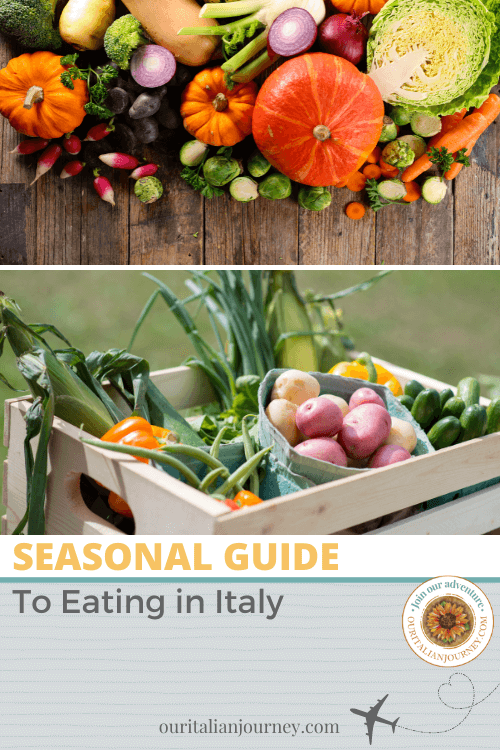

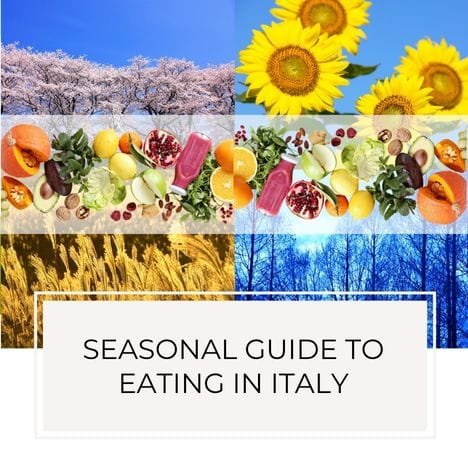
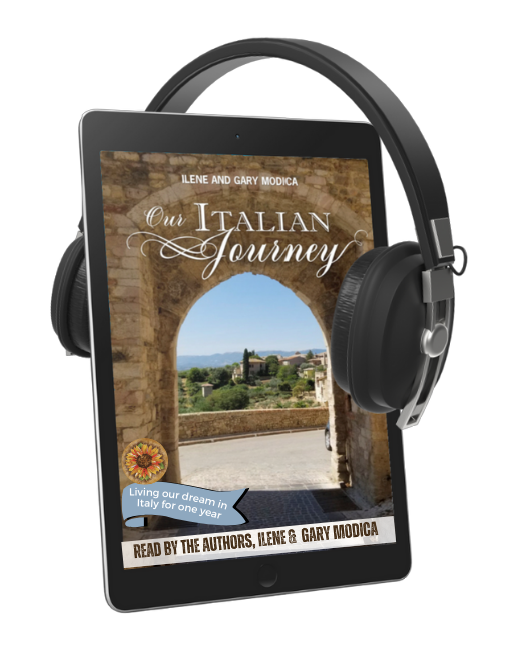

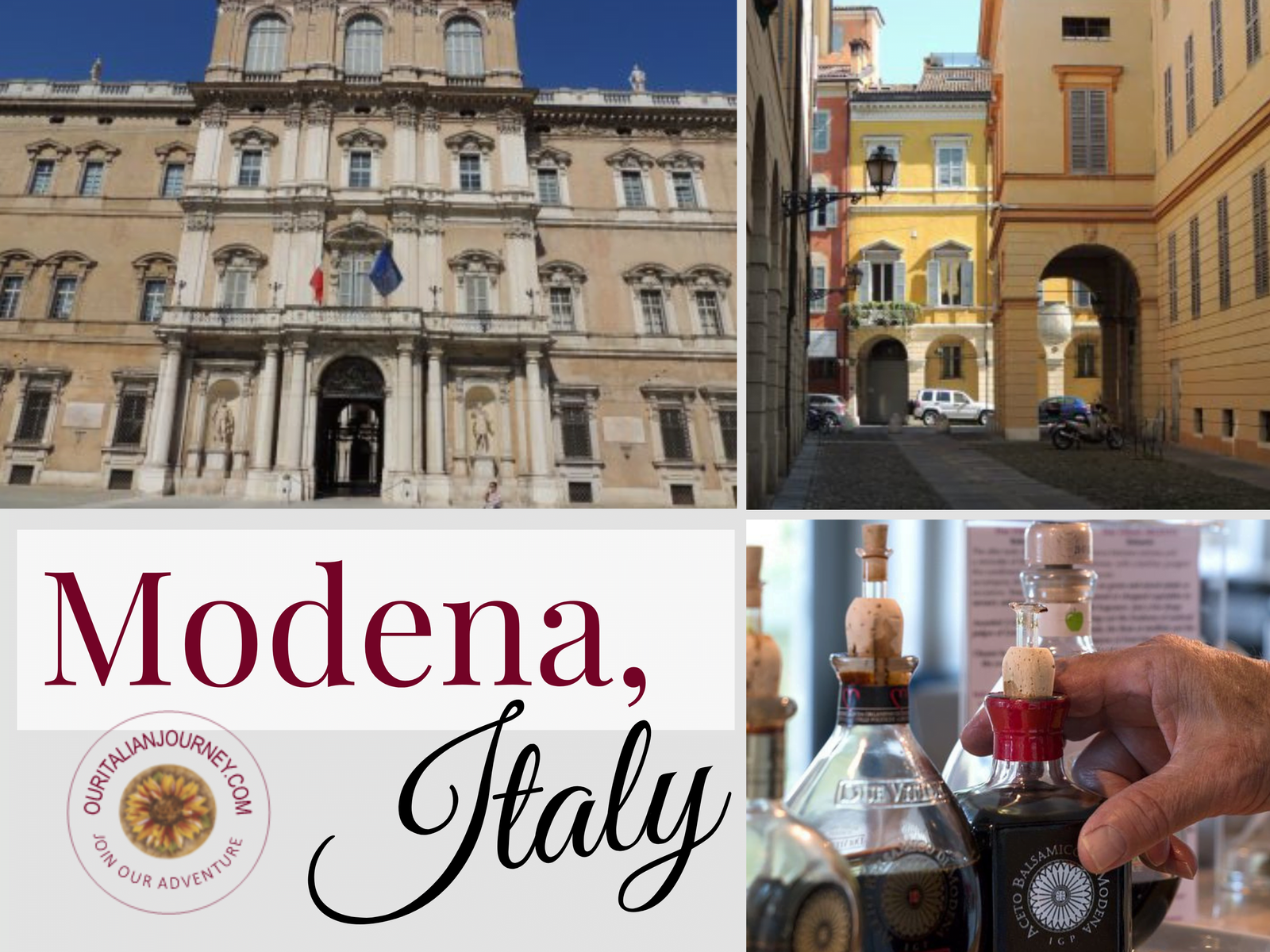

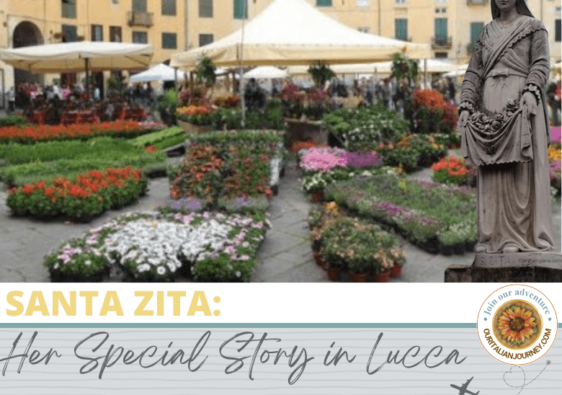
I’m unexpectedly (but delightedly) coming back to Lucca for a few days at the end of April…will that be too late to find castagnaccio and necci? My mom used to tell stories about eating these when she was a little girl and I was hoping to try some.
Ciao Julie – I’m happy you enjoyed this post. Let us know when you are here, please! I think you’ll be able to find both of these. I don’t think these are “seasonal” but perhaps another reader could share some light.
By the way — your post made my mouth water!
Nothing better than fresh produce artfully cooked into a delicious local “cucina povero” dish! Thanks for the guide, the individual list of ingredients is making my mouth water.
I agree Angelo – there is nothing better. Funny, I didn’t intend to get everyone hungry with this post!
I love this post, especially now knowing that figs will be in season when I visit at the end of June. My grandpa had a fig tree when I was growing up and I will never forget biting into the lovely juiciness of that sweet fruit!
I love that you learned something – I love figs too! I can only imagine how picking the figs from your grandfathers tree must have been so amazing!
So much nicer to enjoy produce in season and harvested from the field, not a greenhouse. Asparagus and strawberry seasons are my favourite, although maybe asparagus is controversial for some?
Ciao, Ilene. I will be in Lucca at La Boheme for a week, starting on Tuesday, March 5th. So looking forward to pleasant lunches and dinners. My two traveling companions and I hope to eat where the locals go. Your posts are a delight. Thank you.
Great list of fantastic Italian classics I would add the abundance of fresh seafood, octopus, tuna, swordfish,etc., caponata and linguine in a pistachio cream sauce we enjoyed in Sicily.
Ohhhhh great add-ons, Sal! Sicily is a whole other food heaven! We are headed there this year to work on our next guidebook… (hint, hint)